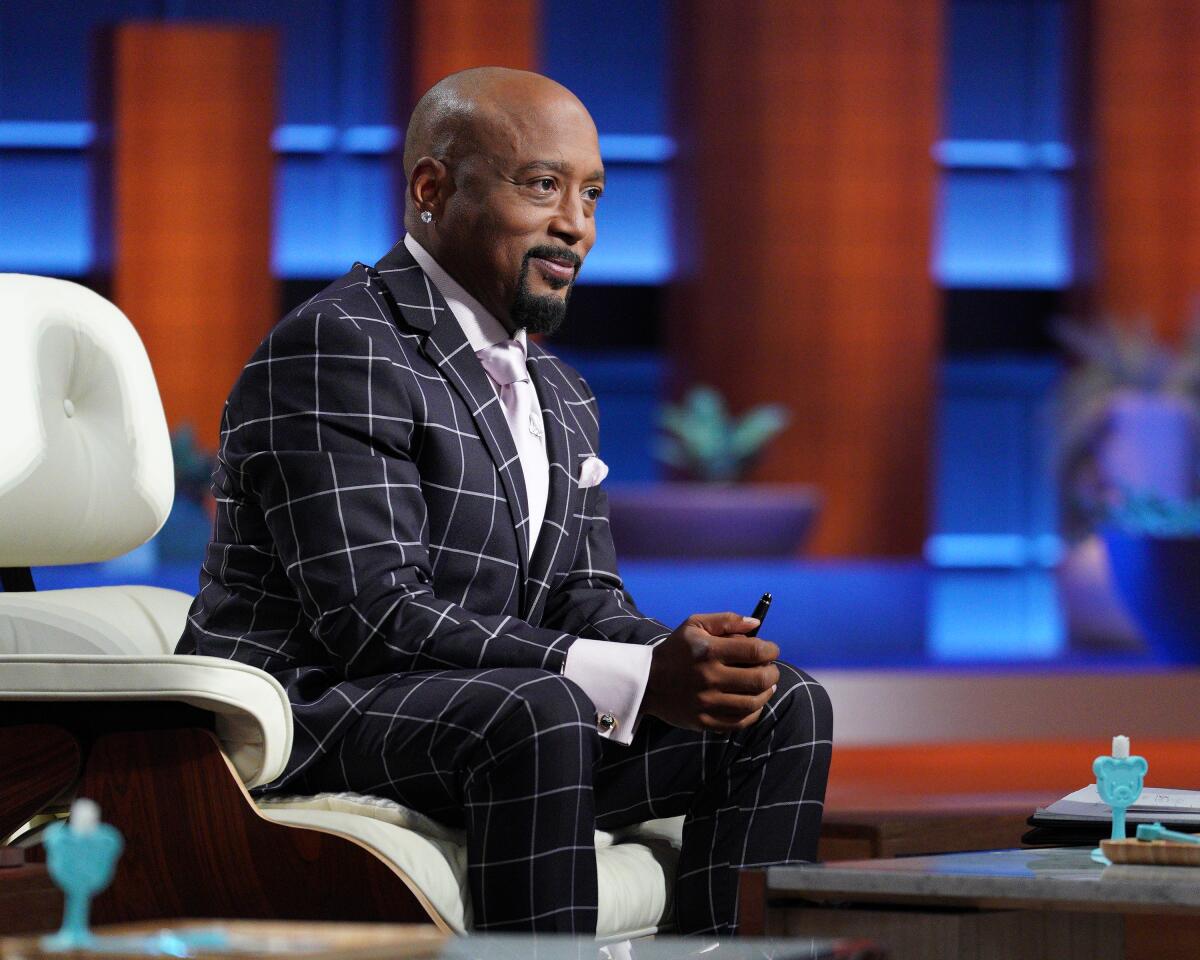‘Shark Tank’s’ Daymond John granted permanent restraining order against former contestant

- Share via
“Shark Tank” celebrity investor Daymond John was issued a permanent injunction against former contestants Al “Bubba” Baker and his daughter, Brittani, as well as his wife, Sabrina, following a hearing in federal court in New Jersey.
The ruling makes permanent the temporary restraining order and preliminary injunction granted by Judge Robert Kugler against the Bakers last month.
The order prohibits the Bakers from further publicly discussing what they have alleged is their “nightmare” experience in the aftermath of their participation on the ABC reality TV show. Further, the Bakers must take down the “disparaging” social media posts they put up discussing their business relationship and experience with John.
The judge’s decision also bars the Bakers from making any disparaging statements and to take down any social media posts that do so about Rastelli Foods Group, a meat manufacturer retained to produce the Bakers’ patented Bubba’s Q Boneless Baby Back Ribs and a partner along with the Bakers and John in the ribs venture.
Rastelli Foods Group alleged the Bakers had made false and defamatory statements against it. John had established an entity called DF Ventures — also a plaintiff in the case — to do business with the Bakers’ ribs company.
“All the Bakers’ posts are negative, disparaging, or both and certainly could impact DFV’s and John’s reputation, goodwill, and credibility,” Kugler wrote in his order issued Friday, adding, “These posts clearly caused reputational harm that John will now have to deal with and counter.”
In granting the initial restraining order, Kugler said that the Bakers had breached a 2019 settlement agreement in which they agreed not to disparage John and Rastelli.
According to the permanent order, the judge found that the Bakers had “breached” the settlement agreement’s non-disparagement clause and ruled to “forever bar” the Bakers from any further violations, including making any such public comments on social media or through news outlets.
According to the court filing, John testified that as a result of Bakers’ comments, “a major television network canceled a show” that he was involved with that had been “previously greenlit.” He further claimed that he lost a “speaking engagement and a ‘major brand’ he was meant to do an activation with stopped all discussions with him while the defendants put out their posts.”
In his ruling, the judge questioned the Bakers’ actions, saying the court could “only draw one logical conclusion: the Bakers are not doing this to try to improve the business or to further some other legitimate purpose. Instead, the Bakers’ enmity, antipathy, and animosity toward John, DFV, and the Rastellis overcame their financial self-interest and their ability to reasonably work through their issues with John, DFV, and the Rastellis.”
The Bakers declined to comment.
“Today’s decision against the Bakers, their company, and their false statements is a moment of vindication,” John said in a statement. “The actual facts, the record and the federal Judge’s opinion have confirmed that I did not — and could not have — committed any wrongdoing. I have always upheld transparency and honesty throughout my journey as an entrepreneur.”
“We firmly believe that the facts and evidence presented in court speak for themselves, which ultimately led to our successful outcome,” said Ray Rastelli III, the company’s vice president, in a statement provided following publication. “The verdict serves as a clear illustration of our commitment to conducting our business in good faith and upholding ethical practices both now and in the future.”
The legal action came after the Bakers were the subject of an L.A. Times investigation in which they accused John and some of his associates and partners of misleading them, trying to take over their business and depriving them of the profits from potentially lucrative partnerships.
They raised questions about the business deal they entered into with John and Rastelli Foods after they appeared on Season 5 of “Shark Tank.”
John and Rastelli Foods had originally filed suit against the Bakers in May. The court dismissed the cases without prejudice, citing jurisdictional issues. John and Rastelli Foods filed amended complaints.
In his complaint, John refuted many of the Bakers’ claims, saying that he played a key role in helping their business. He said he was a non-managing partner of the company with “no access to the company’s bank accounts or credit cards, nor to its books and records” and that his role and duties “are limited to acting as a ‘brand ambassador.’”
In his ruling, Kugler found that John’s description of his role in the business followed “findings of fact.”
Further, he denied the Bakers’ claim that John had violated some agreements first, stating that he and DFV had “complied with all the agreements, at all times.” Further, John made at least $200,000 in capital contributions to the business while receiving “much less than that in distributions,” and allowed the Bakers “an unlimited license to use his intellectual property to promote the product.”
In an amended complaint dated June 7, John alleged that Al Baker had charged about $60,480 in unauthorized personal expenses to the company’s credit card since March 2020.
Further, John claimed he was operating “at an overall financial loss” from his dealings with the Bakers, who he alleged received approximately $744,600.
Earlier, Brittani Baker denied the allegation about the credit card usage in an email to The Times, saying that the charges were business expenses and that any personal charges were refunded at the end of each month. “Prior to this no one (Rastellis or Daymond John) has ever said we misused the company credit card,” she said.
The Bakers claimed that after the on-air offer of $300,000 for 30% of the company they agreed to, John later changed the terms of the deal to $100,000 for a 35% stake. They said that John ignored their complaints about the former “Shark Tank” contestant he enlisted to build their website and whom they said controlled the business’ bank account.
Further, they alleged that their partnership with John and Rastelli Foods was problematic, and that Al Baker was excluded from key business meetings and left in the dark regarding real-time financial information. They say they have received only about 4% of the publicly stated $16 million in revenue from the business.
Just days after The Times’ story, John posted a 3½-minute video response on Twitter, TikTok and other social media platforms, accusing the Bakers of violating a confidentiality agreement and describing The Times article as a “flawed interview and false narrative.”
By then, the Bakers had already also shared many of their own videos across multiple social media platforms, repeating many of the claims they outlined in The Times, while also making additional assertions.
John’s lawyers issued the family a cease-and-desist letter informing them that they “were in breach of the agreements” and demanding they stop “making publicly disparaging or defamatory remarks against Plaintiffs, and further, cease publicly revealing confidential information,” according to court filings.
The Bakers have said that they have the right to speak publicly about their experiences.
After John’s filing, they continued to post videos on social media airing their claims against John and Rastelli Foods.
As recently as June 14, Al Baker outlined his complaints against John and Rastelli in an interview with a local CBS news affiliate in Cleveland.
“It is our belief that Rastelli Foods and Daymond John have breached the settlement agreement by excluding Al from participation and collaboration regarding the product,” according to the rejoinder letters the family sent to the court. These actions, they said, “are causing us irreparable harm, particularly as the time on our patent is running out.”
More to Read
Inside the business of entertainment
The Wide Shot brings you news, analysis and insights on everything from streaming wars to production — and what it all means for the future.
You may occasionally receive promotional content from the Los Angeles Times.










